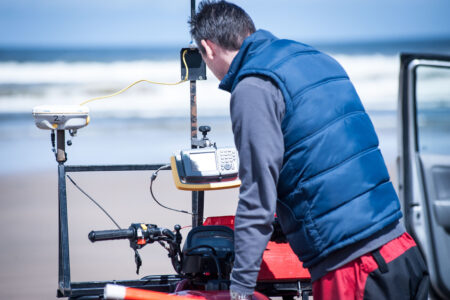Fionnuala Cullen has harboured an interest in food and nutrition since her undergraduate degree, and she was eager to dive deeper into this field. Since she’s a teacher in Melbourne, Fionnuala sought a programme that could fit around her personal and professional life. That’s when she came across the MSc Food and Nutrition programme at Ulster University.
“The flexibility of distance learning was something that instantly appealed to me when looking into the MSc Food and Nutrition programme,” she says. “As I began to research the programme, I realised that the modules being offered were also really appealing to me. I discovered that through the completion of this programme, I would be in a better position to apply for roles in the food industry.”
Situated in Northern Ireland, Ulster University is a leading institution of higher education in the UK and Ireland. In the recently published Guardian League Tables 2024, Ulster University is ranked as the best university in the UK for Nutrition and Food Science. Home to the School of Biomedical Sciences, it offers a comprehensive range of postgraduate programmes that blend cutting-edge research with transformative teaching methods. Here, students can opt to study full-time, part-time and virtually depending on their choice of programme.
One of the standout features of Ulster University’s postgraduate provision is its inclusive and diverse community. With students hailing from over 70 nationalities, the university offers a truly global experience. The institution’s commitment to student support extends to all and goes beyond academic support, focusing on the overall well-being of students. Pair that with world-class teaching, state-of-the-art facilities and outstanding pastoral care, and Ulster University students have an environment where they can thrive and flourish. In fact, the Postgraduate Taught Experience Survey (2022) reports 85.5% of students within the School of Biomedical Sciences were satisfied with the quality of their course.

With students hailing from over 70 nationalities, the university offers a truly global experience. Source: Ulster University, Nigel McDowell
Fionnuala may have been thousands of kilometres away from Ulster University but she always received support from the university throughout her academic journey. “I have found from the beginning there has always been someone to respond to questions, help with extra assistance and offer extensions to deadlines when I was unable to meet these,” she says.
Whether you want to build your expertise, change your career, or grow your business, Ulster University’s postgraduate programmes can help you reach your goal. Its flexible online programmes — PgCert/PgDip/MSc Food and Nutrition, PgCert/PgDip/MSc Food Regulatory Affairs and PgDip/MSc Veterinary Public Health (Food Regulatory Affairs) — are designed to foster student success through innovative assessment methods.
Meanwhile, the MSc Human Nutrition, an intensive on-campus 12-month programme, provides practical classes and tutorials in nutrition and food science with a strong emphasis on human nutrition research. It is offered on the Coleraine campus, nestled on the stunning north coast of Ireland. The cost of living is considerably lower here compared to other locations making education accessible without compromising on quality.
Ulster University’s programmes — on campus and fully online — are accredited by prestigious professional bodies such as the Association for Nutrition and the Institute of Food Science and Technology, underscoring their quality and relevance in the field.
At the heart of Ulster University’s offerings lies the Nutrition Innovation Centre for Food and Health (NICHE), a hub of research excellence and one of the largest nutrition research centres within the UK and Ireland. NICHE’s 100 members — including academic, research, technical, and business support staff, as well as PhD researchers, postgraduate students and interns — aim to solve the chronic diseases of ageing, obesity, cancer, heart disease, osteoporosis and cognitive decline by investigating the potential impact of diet and food quality on the underlying mechanisms leading not only to disease but also to maintaining health. Ulster University’s postgraduate programmes are taught by staff that are based within NICHE, many of whom are experts in their field.
Such initiatives ensure students receive hands-on experience and a top-tier education rooted in the latest research developments. Just ask Fionnuala:
“Having staff members who are experts in nutrition teaching has meant that I receive great support in my learning,” she says. “This has been particularly evident throughout my research project that I am currently undertaking. My supervisor, is an expert in the area that I am researching, and his knowledge has really helped to guide me on the project.”
Another student, Ekunola Elizabeth Akinlayo, an MSc Human Nutrition student agrees. “The experience has provided me with an expanded understanding of food and the scientific significance of maintaining a nutritious diet for the overall health and well-being of individuals.”

The diverse student body has allowed students to think critically about other people’s opinions and look at the world in a novel way. Source: Ulster University, Nigel McDowell
While her programme doesn’t include placements, students do benefit from experiential learning. Elizabeth had such an opportunity during a class visit to a local food business. “I got to observe the entire food production process, encompassing cultivation, harvesting, processing, and storage,” she says. “This experience provided me with a comprehensive understanding of the farm-to-fork concept.”
These programmes open doors to a world of opportunities in a thriving sector, thanks to the university’s strong links with the food industry. Employability is a key goal of the curriculum ensuring that Ulster University graduates have the essential attributes required for working in the area of food and nutrition. Ulster University have a thriving alumni community all over the globe, helping graduates to maintain their links with Ulster University.
The success stories of Ulster University graduates showcase the tangible outcomes of these programmes. In another example, Soteris Christophe, a recent graduate from the MSc Veterinary Public Health (Food Regulatory Affairs) had his research project published in a prestigious scientific journal, underscoring the practical relevance and the importance of the coursework.
“The publication of my thesis in a prestigious scientific journal of the veterinary field is a fact that indicates the high level of the course, but foremost, the quality of the assistance and guidance I received from my academic supervisor. This cooperation continues even beyond my graduation and lasts in time, until today.”
Click here to learn more about Ulster University and its programmes.
Follow Ulster University on Facebook, Instagram, X, and YouTube, and you can also follow NICHE on X, Facebook, LinkedIn and on their website












